Another day, another hearing on China on Capitol Hill.
The House Foreign Affairs Committee held a hearing on Feb. 28 titled “Combatting the Generational Challenge of CCP Aggression”, with the main topic members and witnesses from the State and Commerce departments being export controls. Lastly, “decoupling” was brought up by Chairman Michael McFaul (R-TX) and quickly shot down by the witnesses.
McCaul called China a “generational threat to the United States” in his opening remarks. He noted that much of China’s tech prowess has come thanks to some $600 billion in intellectual property theft. No other country in the emerging markets has grown so fast and become so tech savvy as has China, with its companies – from Lenovo computers to ByteDance app TikTok – known the world over. Americans would be hard-pressed to name a single French tech company, let alone a smartphone application.
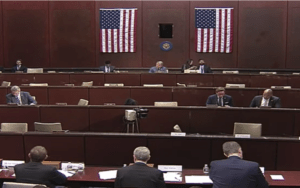
Scene from the Foreign Affairs Committee in the House on Feb. 28, 2023 in a hearing titled Combatting the Generational Challenge of CCP Aggression.
“We are living through one of the most dangerous periods in American foreign policy in a generation,” McCaul said at the start of a marathon, hours-long hearing session on Tuesday. “It is a struggle for the global balance of power and the primary battleground is technology leadership,” he said.
One of the tools Washington has used in this struggle is the Entity List by the Commerce Department, tech product bans by the Department of Defense, and capital market sanctions imposed by the Treasury Department, which bans Wall Street from investing in Chinese defense contractors. There was heated debate in the Committee as to whether any of this was working, with the State and Commerce officials having to play defense most of the day.
Congress authorized the Bureau of Industry and Security (BIS) with expansive powers to stop the transfer of dual-use technology that the CCP is using to build its military. It is unclear if these bans are working, McCaul said.
Ranking member Greg Meeks (D-NY) said that the BIS is very clear as to what is banned, so companies know what not to try to ask permission for. He said the confusion largely comes from products not on the list, but are similar enough. And most of those seem to be getting through.
In just one recent six-month time period, BIS approved licenses worth $60 billion dollars to Huawei and $40 billion to SMIC, China’s most well-known semiconductor company. Both of these companies are military contractors. Both are listed on the Entities List.
Meeks disagreed with McCaul that the BIS list was porous. He also said the U.S. had to confront China diplomatically, not just on the domestic front with business-friendly policies.
“If we’re simply in the countering China business phase, we’re not living up to our responsibilities to the American people. We must compete diplomatically. Our alliances and partnerships are our superpower,” Meeks said in his opening remarks, adding that any hostilities towards China, like a war, would be “catastrophic.” He said it would “devastate our economy. We must make it clear that we do not seek war and we will work to avoid it.”
Key Witnesses Opening Remarks
While there were four witnesses at Tuesday’s hearing, Daniel Kritenbrink, Deputy Assistant Secretary of State for East Asia and the Pacific, and Alan Estevez, the Undersecretary of Commerce for Industry and Security, were the two whose opinions were most sought after by members of Congress.
Kritenbrink warned in his opening remarks that China can “reshape the international order”. He made reference to the State Department’s new China strategy to “invest, align and compete”. He lauded the passage of the CHIPS Act, the Inflation Reduction Act and the Infrastructure Law. “We are aligning with allies and partners,” he said. No one on the Committee made note that the European Union stands against policies in the Inflation Reduction Act that target electric vehicle subsidies.
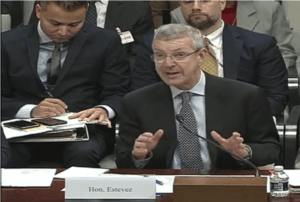 Estevez noted that Japan and The Netherlands were at least two countries participating alongside the U.S. with the tech restrictions.
Estevez noted that Japan and The Netherlands were at least two countries participating alongside the U.S. with the tech restrictions.
“Our export controls work best when applied on a multilateral basis with allies and partners,” he said in his opening remarks. “We added new controls on certain high-capability chips, components going into China’s supercomputers, semiconductor tools, and items going into China’s advanced fabrication facilities, or fabs. We also impose restrictions on certain activities of U.S. persons, which limits the abilities of Americans to support the maintenance and operation of these technically complex machines at China’s advanced fabs,” he said. Since the beginning of the Biden Administration, we have taken an aggressive posture adding 160 China parties to the Entity List. Approximately, 25% of all China-listed entities were added during this administration.”
Some Q&A Banter from the Hearing
Here are some of the questions and comments (or lack thereof) at Tuesday’s hearing.
On Entities List restrictions:
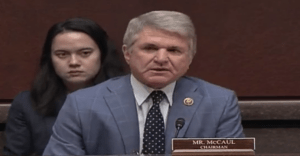 Rep. McCaul: From January 2022 to March 2022, BIS denied eight percent of license applications and [ap]proved more than $23 billion worth of license applications to Chinese companies on the Entities List. How does this align with your statement that, quote, “We are doing everything within BIS’ power to prevent sensitive U.S. technologies from getting in the hands of PRC military, intelligence services, or other parties?”
Rep. McCaul: From January 2022 to March 2022, BIS denied eight percent of license applications and [ap]proved more than $23 billion worth of license applications to Chinese companies on the Entities List. How does this align with your statement that, quote, “We are doing everything within BIS’ power to prevent sensitive U.S. technologies from getting in the hands of PRC military, intelligence services, or other parties?”
Estevez: It’s an interagency process that is done with my colleagues in Defense, State, and Energy and we all have different licensing rules. The Entity List is not a blanket embargo so going on the Entity List may have a particular rule. And in the case of Huawei and SMIC, there are particular rules. SMIC is now, of course, subject to the rule that we put out in October on semiconductor manufacturing. Huawei is allowed tech below 5G, below cloud level.
Rep. Andy Barr (R-KY): Last year, BIS and its interagency partners approved approximately 69.9% of license applications involving China and denied or returned without action approximately 30% of such licensed applications. How many of those BIS licenses were approved for companies on either the Defense Department’s list or Treasury’s Chinese military companies list?
Estevez didn’t have an answer.
This is a problem and not acceptable as the Non-SDN Chinese Military Industrial Complex Companies List (NS-CMIC List) maintained by Treasury is supposed to be instituting a ban on the buying and selling of securities of the listed companies, all Chinese military and surveillance tech companies. If the U.S. Government is not sure whether or not it is enforcing export license bans on these companies that have an investment ban, then there are more holes in the U.S. sanctions regime than CPA has been tracking thus far. The U.S. sanctions regime — and especially its application toward Chinese bad actor companies — is like Swiss cheese, says Robby Saunders Smith, vice president for national security at CPA.
“CPA supports sanctions harmonization legislation to close these gaps. Part of that is synchronizing the lists,” she said about such lists maintained by the Department of Defense, Treasury, and Commerce.
Rep. Barr: How important is it that Commerce Entity List designations be coordinated or be cross-referenced by Treasury or Defense for purposes of sanctions to prevent American investors from financing entities tied to the CCP or these Chinese military-industrial complex firms that are still included in emerging growth index funds, either on U.S. exchanges or foreign stock exchanges or even through private equity or credit investments?
Estevez: Investors should be looking at all those lists. As far as coordination between myself, the Treasury Department and Department of Defense, we actually have pretty excellent coordination going on right now,
Barr doubted that. He said, “I don’t think that they’re aligned, frankly, with your Entity List and certainly not with some of these other lists, the military-end user list for example.
CPA agrees with Barr. CPA also notes that the investors are not looking at the BIS Entity List. They are not required to do so and are still deeply invested in China. Unless required by Treasury or Congress, investors will continue to put money to work in Chinese companies on one or more restricive lists maintained by the U.S. government.
Rep. Barr: Do you have visibility into Chinese Entity List companies that remain in index funds listed on U.S. or other exchanges?
Estevez: I do not.
Rep. Barr: That’s what we need. Companies on the BIS Entity List need to be included on the Treasury cap market sanctions list. Believe me, we are going to talk to Treasury about this problem.
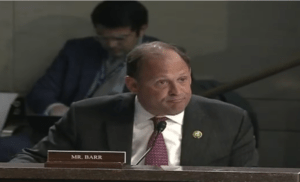 CPA commends Rep. Barr on his questioning and totally agrees with his assessment of the lack of coordination across agencies. The agencies may be in touch with one another, but the policies and punitive measures are not coordinated…or effective at stopping investing, said Saunders Smith. CPA supports legislation offered by Rep. Barr (H.R. 760) designed to increase the scope of sanctions coverage, routinizes list updates, expands coverage to include parent and subsidiary companies to capture the entire corporate family tree, clarifies punitive measures, and make more clear the application of sanctions and required behavioral changes. Legislation is needed that also increases transparency and information provided by companies to retail investors, as well as regulators.
CPA commends Rep. Barr on his questioning and totally agrees with his assessment of the lack of coordination across agencies. The agencies may be in touch with one another, but the policies and punitive measures are not coordinated…or effective at stopping investing, said Saunders Smith. CPA supports legislation offered by Rep. Barr (H.R. 760) designed to increase the scope of sanctions coverage, routinizes list updates, expands coverage to include parent and subsidiary companies to capture the entire corporate family tree, clarifies punitive measures, and make more clear the application of sanctions and required behavioral changes. Legislation is needed that also increases transparency and information provided by companies to retail investors, as well as regulators.
Rep. Young Kim (R-CA): What specific steps have you taken to work with the Defense Department to harmonize these lists? And when can we expect this process to be implemented?
Estevez: Different lists have different authorities around them. So the Defense list, which is required by 1999 NDAA, I believe, has no consequence for the companies that are listed, whereas the Entity List, which requires factual and articulable information in order to put someone on the Entity List has consequences for the company. So I need data in order to put someone on the Entity List as opposed to research. I also have to really want to see if there’s exports to that company because otherwise, it’s a useless enterprise, though we do put people on the Entity List with very few exports. The Defense Department can always propose someone to go on to the BIS Entity List.
Estevez did not mention that the 1999 National Defense Authorization Act (NDAA), Section 1237 list, was updated in fiscal year 2021 and is now known as the section 1260H list. He also did denote the criteria Congress prescribed for inclusion on the Department of Defenses restrictive lists for foreign companies. “The Defense Department needs greater engagement in the economic statecraft space,” said Saunders Smith, adding that Treasury needs to act on investment bans once the Defense Department has listed them as a problem.
As an aside, Estevez said social media app TikTok is a real problem. “The Committee on Foreign Investment in the United States (CFIUS) is adjudicating that process right now,” he said about Byte Dance’s TikTok.
Quick thoughts on China Rx and critical supply chains:
At one point, there was a lot of talk about China’s influence over U.S. corporations. The gist was that the U.S. is beholden to China for market access, and often has to abide by China’s rules even if the product they are making is universal and will be sold or promoted globally, as well as in China (think NBA and Hollywood, as examples.)
Supply chain dependence on China also came up, but no one discussed reshoring as this was not really a domestic-focused hearing.
Rep. Christopher Smith (R-NJ): Where are we in standing up to countries that are friends or not within regards to a domestic capability of producing important pharmaceuticals and the active ingredients and key starting materials that are all important in making them? And I would include antibiotics. Where are we on that?
Kritenbrink: On pharmaceuticals, I think the general point that I would make…is that we have tried to make clear to countries around the world that they need to have diverse supply chains. And so, promoting the diversity of supply chains gives countries options, and makes them less subject to coercion and undue influence.
Rep. Brad Sherman (D-CA): China controls our corporations. People are trying to run companies over here and I think they deserve to know whether Most Favored Nation for China would end if China blockades or invades Taiwan? Can you give them that answer? Do they have to fly blind?
No answer by Kritenbrink.
Rep. Aumua Amata Coleman Radewagen (R-American Samoa): How many China-made chips are you comfortable with having in our defense systems and in our critical infrastructure?
Estevez: No microchip in a defense system should come from anywhere else, except for the United States. I believe that we are stopping the most advanced chips from being made in China.
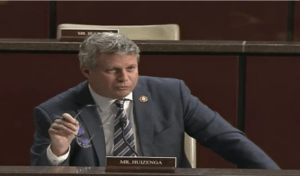 Rep. Bill Huizenga (R-MI): Is dependence on China for (EV) batteries a national security issue?
Rep. Bill Huizenga (R-MI): Is dependence on China for (EV) batteries a national security issue?
Estevez: There’s a whole bunch of technologies that we need to start doing investment on in the United States. We should not be reliant on China for batteries, for chips, for pharmaceutical precursors, for rare-earths. We need to look at our supply chains better.
Some ‘decoupling’ talk:
Turning the U.S. into a more self-reliant industrial power was not a topic of discussion this week. When it was alluded to by Rep. Colin Allred (R-TX) and, later, McCaul, State Department official Kritenbrink shut it down.
“We have a $750 billion trading relationship with China,” he reminded the Committee. “I think the point that we’re making here today in talking about Entity List decisions and other regulatory tools is that we’re trying to take narrow, targeted steps that prevent China from using those commercial interactions to increase the capabilities of People’s Liberation Army that would endanger American national security.”
McCaul: Why is it that you don’t consider decoupling from an adversarial nation that is out to try to eliminate the U.S. dollar from the global currency and remove us from being a superpower? Why would you be against that?
Kritenbrink: Our policy is not to pursue decoupling. Our policy is to counter those behaviors by China in a way that we think best serves the American national interest.
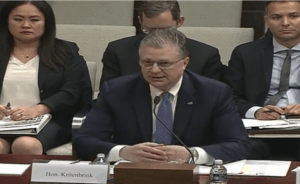 Rep. Tim Burchett (R-TN): I fear that the U.S. government has been compromised by the Communist Chinese.
Rep. Tim Burchett (R-TN): I fear that the U.S. government has been compromised by the Communist Chinese.
McCaul said that the U.S. was falling behind on the “ideological battlefield” with China throughout the world. Allred said the U.S. was losing the soft power battle, as well. Soft power is a measure of cultural influence and foreign perception of a country.
“We should keep soft power in mind,” Allred said.
Of the 6.3 billion people living in developing countries, about 70% have a positive view of both China and Russia, McCaul said, citing an unnamed poll.
Congress appropriated $325 million to the State Department to counter CCP’s malign influence around the world. But, instead, that money was used to fund bakeries in Tunisia, electric vehicle charging stations in Vietnam, McCaul said in a dig to the Democrats in the room.
Meanwhile, the CCP continues to invest large amounts of money in economic development worldwide, growing its influence over the people in these nations, he said.
As a highlight, Rep. Maria Elvira Salazar (R-FL) had this to say on the soft power front: “Chairman Xi Jinping has been to Latin America more times than Presidents Obama, Trump, and Biden combined in the last 10 years.”
Lastly, Kritenbrink did bring up the China surveillance balloon. A handful of Committee members asked about it. He said the spy balloon wreckage is being examined and that the government will “learn more about the balloon” from what it recovered from the sea after shooting it down in South Carolina waters last month.
House Foreign Affairs Committee Spars Over China Export Controls
Another day, another hearing on China on Capitol Hill.
The House Foreign Affairs Committee held a hearing on Feb. 28 titled “Combatting the Generational Challenge of CCP Aggression”, with the main topic members and witnesses from the State and Commerce departments being export controls. Lastly, “decoupling” was brought up by Chairman Michael McFaul (R-TX) and quickly shot down by the witnesses.
McCaul called China a “generational threat to the United States” in his opening remarks. He noted that much of China’s tech prowess has come thanks to some $600 billion in intellectual property theft. No other country in the emerging markets has grown so fast and become so tech savvy as has China, with its companies – from Lenovo computers to ByteDance app TikTok – known the world over. Americans would be hard-pressed to name a single French tech company, let alone a smartphone application.
Scene from the Foreign Affairs Committee in the House on Feb. 28, 2023 in a hearing titled Combatting the Generational Challenge of CCP Aggression.
“We are living through one of the most dangerous periods in American foreign policy in a generation,” McCaul said at the start of a marathon, hours-long hearing session on Tuesday. “It is a struggle for the global balance of power and the primary battleground is technology leadership,” he said.
One of the tools Washington has used in this struggle is the Entity List by the Commerce Department, tech product bans by the Department of Defense, and capital market sanctions imposed by the Treasury Department, which bans Wall Street from investing in Chinese defense contractors. There was heated debate in the Committee as to whether any of this was working, with the State and Commerce officials having to play defense most of the day.
Congress authorized the Bureau of Industry and Security (BIS) with expansive powers to stop the transfer of dual-use technology that the CCP is using to build its military. It is unclear if these bans are working, McCaul said.
Ranking member Greg Meeks (D-NY) said that the BIS is very clear as to what is banned, so companies know what not to try to ask permission for. He said the confusion largely comes from products not on the list, but are similar enough. And most of those seem to be getting through.
In just one recent six-month time period, BIS approved licenses worth $60 billion dollars to Huawei and $40 billion to SMIC, China’s most well-known semiconductor company. Both of these companies are military contractors. Both are listed on the Entities List.
Meeks disagreed with McCaul that the BIS list was porous. He also said the U.S. had to confront China diplomatically, not just on the domestic front with business-friendly policies.
“If we’re simply in the countering China business phase, we’re not living up to our responsibilities to the American people. We must compete diplomatically. Our alliances and partnerships are our superpower,” Meeks said in his opening remarks, adding that any hostilities towards China, like a war, would be “catastrophic.” He said it would “devastate our economy. We must make it clear that we do not seek war and we will work to avoid it.”
Key Witnesses Opening Remarks
While there were four witnesses at Tuesday’s hearing, Daniel Kritenbrink, Deputy Assistant Secretary of State for East Asia and the Pacific, and Alan Estevez, the Undersecretary of Commerce for Industry and Security, were the two whose opinions were most sought after by members of Congress.
Kritenbrink warned in his opening remarks that China can “reshape the international order”. He made reference to the State Department’s new China strategy to “invest, align and compete”. He lauded the passage of the CHIPS Act, the Inflation Reduction Act and the Infrastructure Law. “We are aligning with allies and partners,” he said. No one on the Committee made note that the European Union stands against policies in the Inflation Reduction Act that target electric vehicle subsidies.
“Our export controls work best when applied on a multilateral basis with allies and partners,” he said in his opening remarks. “We added new controls on certain high-capability chips, components going into China’s supercomputers, semiconductor tools, and items going into China’s advanced fabrication facilities, or fabs. We also impose restrictions on certain activities of U.S. persons, which limits the abilities of Americans to support the maintenance and operation of these technically complex machines at China’s advanced fabs,” he said. Since the beginning of the Biden Administration, we have taken an aggressive posture adding 160 China parties to the Entity List. Approximately, 25% of all China-listed entities were added during this administration.”
Some Q&A Banter from the Hearing
Here are some of the questions and comments (or lack thereof) at Tuesday’s hearing.
On Entities List restrictions:
Estevez: It’s an interagency process that is done with my colleagues in Defense, State, and Energy and we all have different licensing rules. The Entity List is not a blanket embargo so going on the Entity List may have a particular rule. And in the case of Huawei and SMIC, there are particular rules. SMIC is now, of course, subject to the rule that we put out in October on semiconductor manufacturing. Huawei is allowed tech below 5G, below cloud level.
Rep. Andy Barr (R-KY): Last year, BIS and its interagency partners approved approximately 69.9% of license applications involving China and denied or returned without action approximately 30% of such licensed applications. How many of those BIS licenses were approved for companies on either the Defense Department’s list or Treasury’s Chinese military companies list?
Estevez didn’t have an answer.
Rep. Barr: How important is it that Commerce Entity List designations be coordinated or be cross-referenced by Treasury or Defense for purposes of sanctions to prevent American investors from financing entities tied to the CCP or these Chinese military-industrial complex firms that are still included in emerging growth index funds, either on U.S. exchanges or foreign stock exchanges or even through private equity or credit investments?
Estevez: Investors should be looking at all those lists. As far as coordination between myself, the Treasury Department and Department of Defense, we actually have pretty excellent coordination going on right now,
Barr doubted that. He said, “I don’t think that they’re aligned, frankly, with your Entity List and certainly not with some of these other lists, the military-end user list for example.
Rep. Barr: Do you have visibility into Chinese Entity List companies that remain in index funds listed on U.S. or other exchanges?
Estevez: I do not.
Rep. Barr: That’s what we need. Companies on the BIS Entity List need to be included on the Treasury cap market sanctions list. Believe me, we are going to talk to Treasury about this problem.
Rep. Young Kim (R-CA): What specific steps have you taken to work with the Defense Department to harmonize these lists? And when can we expect this process to be implemented?
Estevez: Different lists have different authorities around them. So the Defense list, which is required by 1999 NDAA, I believe, has no consequence for the companies that are listed, whereas the Entity List, which requires factual and articulable information in order to put someone on the Entity List has consequences for the company. So I need data in order to put someone on the Entity List as opposed to research. I also have to really want to see if there’s exports to that company because otherwise, it’s a useless enterprise, though we do put people on the Entity List with very few exports. The Defense Department can always propose someone to go on to the BIS Entity List.
Estevez did not mention that the 1999 National Defense Authorization Act (NDAA), Section 1237 list, was updated in fiscal year 2021 and is now known as the section 1260H list. He also did denote the criteria Congress prescribed for inclusion on the Department of Defenses restrictive lists for foreign companies. “The Defense Department needs greater engagement in the economic statecraft space,” said Saunders Smith, adding that Treasury needs to act on investment bans once the Defense Department has listed them as a problem.
As an aside, Estevez said social media app TikTok is a real problem. “The Committee on Foreign Investment in the United States (CFIUS) is adjudicating that process right now,” he said about Byte Dance’s TikTok.
Quick thoughts on China Rx and critical supply chains:
At one point, there was a lot of talk about China’s influence over U.S. corporations. The gist was that the U.S. is beholden to China for market access, and often has to abide by China’s rules even if the product they are making is universal and will be sold or promoted globally, as well as in China (think NBA and Hollywood, as examples.)
Supply chain dependence on China also came up, but no one discussed reshoring as this was not really a domestic-focused hearing.
Rep. Christopher Smith (R-NJ): Where are we in standing up to countries that are friends or not within regards to a domestic capability of producing important pharmaceuticals and the active ingredients and key starting materials that are all important in making them? And I would include antibiotics. Where are we on that?
Kritenbrink: On pharmaceuticals, I think the general point that I would make…is that we have tried to make clear to countries around the world that they need to have diverse supply chains. And so, promoting the diversity of supply chains gives countries options, and makes them less subject to coercion and undue influence.
Rep. Brad Sherman (D-CA): China controls our corporations. People are trying to run companies over here and I think they deserve to know whether Most Favored Nation for China would end if China blockades or invades Taiwan? Can you give them that answer? Do they have to fly blind?
No answer by Kritenbrink.
Rep. Aumua Amata Coleman Radewagen (R-American Samoa): How many China-made chips are you comfortable with having in our defense systems and in our critical infrastructure?
Estevez: No microchip in a defense system should come from anywhere else, except for the United States. I believe that we are stopping the most advanced chips from being made in China.
Estevez: There’s a whole bunch of technologies that we need to start doing investment on in the United States. We should not be reliant on China for batteries, for chips, for pharmaceutical precursors, for rare-earths. We need to look at our supply chains better.
Some ‘decoupling’ talk:
Turning the U.S. into a more self-reliant industrial power was not a topic of discussion this week. When it was alluded to by Rep. Colin Allred (R-TX) and, later, McCaul, State Department official Kritenbrink shut it down.
“We have a $750 billion trading relationship with China,” he reminded the Committee. “I think the point that we’re making here today in talking about Entity List decisions and other regulatory tools is that we’re trying to take narrow, targeted steps that prevent China from using those commercial interactions to increase the capabilities of People’s Liberation Army that would endanger American national security.”
McCaul: Why is it that you don’t consider decoupling from an adversarial nation that is out to try to eliminate the U.S. dollar from the global currency and remove us from being a superpower? Why would you be against that?
Kritenbrink: Our policy is not to pursue decoupling. Our policy is to counter those behaviors by China in a way that we think best serves the American national interest.
McCaul said that the U.S. was falling behind on the “ideological battlefield” with China throughout the world. Allred said the U.S. was losing the soft power battle, as well. Soft power is a measure of cultural influence and foreign perception of a country.
“We should keep soft power in mind,” Allred said.
Of the 6.3 billion people living in developing countries, about 70% have a positive view of both China and Russia, McCaul said, citing an unnamed poll.
Congress appropriated $325 million to the State Department to counter CCP’s malign influence around the world. But, instead, that money was used to fund bakeries in Tunisia, electric vehicle charging stations in Vietnam, McCaul said in a dig to the Democrats in the room.
Meanwhile, the CCP continues to invest large amounts of money in economic development worldwide, growing its influence over the people in these nations, he said.
As a highlight, Rep. Maria Elvira Salazar (R-FL) had this to say on the soft power front: “Chairman Xi Jinping has been to Latin America more times than Presidents Obama, Trump, and Biden combined in the last 10 years.”
Lastly, Kritenbrink did bring up the China surveillance balloon. A handful of Committee members asked about it. He said the spy balloon wreckage is being examined and that the government will “learn more about the balloon” from what it recovered from the sea after shooting it down in South Carolina waters last month.
MADE IN AMERICA.
CPA is the leading national, bipartisan organization exclusively representing domestic producers and workers across many industries and sectors of the U.S. economy.
TRENDING
CPA: Liberty Steel Closures Highlight Urgent Need to Address Mexico’s Violations and Steel Import Surge
CPA Applauds Chairman Jason Smith’s Reappointment to Lead House Ways and Means Committee
Senator Blackburn and Ossoff’s De Minimis Bill is Seriously Flawed
JQI Dips Due to Declining Wages in Several Sectors as November Jobs Total Bounces Back from Low October Level
What Are Trump’s Plans For Solar in the Inflation Reduction Act?
The latest CPA news and updates, delivered every Friday.
WATCH: WE ARE CPA
Get the latest in CPA news, industry analysis, opinion, and updates from Team CPA.
CHECK OUT THE NEWSROOM ➔